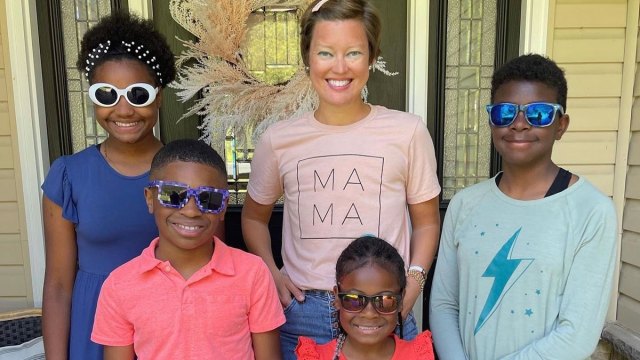Our family looks different. We are two white adults and four Black children ranging in age from teen to kindergartener. It is quite obvious that our family was formed by adoption, and this intrigues many people.
The issue isn’t that we get a lot of second glances, nods, and smiles. We don’t even mind being approached (which happens often), though only when someone is kind. Or, if the person has an adoption connection, sometimes they will share that with us, which is fine as long as they don’t do what many others do—turn our conversation into an interrogation.
We’ve been asked terrible questions right in front of our children. When a cashier saw me and my oldest two daughters, the first thing she said was, “How could someone just give away such beautiful girls?” I was appalled at her word choice and audacity, and I gestured for my husband to take the girls to look at a nearby display.
During another wait in a checkout line, the woman behind me asked, “Are your kids real siblings?” “Yup,” I replied. She then proceeded: “But are they really real siblings?” I took my girls by the hand and walked to the car.
Other times, we’ve been praised. “God bless you for adopting children in need,” said a lady at the park. She was trying to be complimentary, but it was at the expense of my children, who are certainly not charity cases. Likewise, my husband and I aren’t saviors or superheroes.
Related: 14 Brilliant Books About Adoption
We’ve been asked, in front of our kids, why we couldn’t have “our own” children. I have always said, “They are our own children.” After all, adoptive families—parents and kids included—aren’t fake.
Once, while eating out, a server asked if my children were born addicted to drugs. A lady in the airport bathroom line asked why my kids’ birth parents “gave them away.” These questions rarely have a lead-in, and the askers seem not to care that they are speaking about my kids as if they aren’t right there.
An elderly man at the gym once asked why I didn’t “adopt one of my own kind” (meaning white). Another person enquired as to where I got my daughter from—as if I ordered her from the store.
Even worse, some choose to directly ask our children questions about their adoption stories and health history or about things that are important to their culture. One time, a lady in the grocery store line tried to touch my daughter’s fresh braids (I body-blocked her) before bending down to my child’s eye level and asking, “Did that take a long time?” I chimed in that it takes a few hours. The lady was astounded. “That long? Oh my.” It’s patronizing. Plus, my kids aren’t animals on display at a petting zoo—and strangers shouldn’t be trying to touch them.
I know what some of you are thinking. People are curious. I understand this. But being curious doesn’t give someone the right to treat a child like they’re under investigation for merely existing. Attempting to touch their hair—whether it be in braids or an afro—is inappropriate.
My children are human beings who deserve privacy and respect. Just because they are adoptees doesn’t mean they “owe” anyone an explanation or an “intriguing” story. As adoptive parents, we have plenty of clapbacks to put demanders in their place, and we’ve worked on this with our kids as well. People need to learn to mind their manners and stop acting like they’re entitled to a child’s history. It doesn’t matter why they want to know. At the end of the day, the “juicy details” are none of their business.
So what should one say to an adoptive family? “You have a beautiful family” sounds about right.











